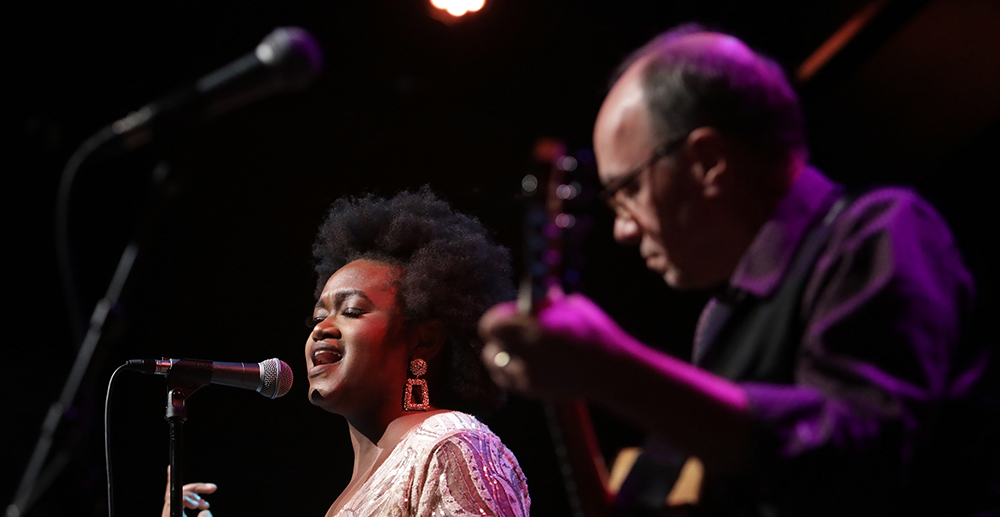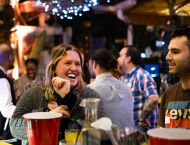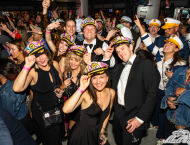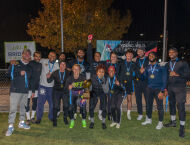Music
 AYO on left // Photo: Jim Saah
AYO on left // Photo: Jim Saah
AYO Gets Help And Opportunity At Strathmore With AIR
January 14, 2020 @ 12:00am
AYO needed help. That’s the first thing she mentions when discussing her recent inclusion as one of Strathmore’s Artist in Residence (AIR). The program is intended to help them gain opportunities to perform, create and teach workshops at the Bethesda-based arts center.
Being an independent artist while juggling an upcoming EP, singles and performances is a full time job, and if you couple that with limited resources, the life can seem daunting. For a majority of her early life, AYO never even considered the path of a full-time musician, citing that she enrolled at Howard University to study Biology. Despite this, her undeniable talent behind a microphone coupled with her messages of empowerment have made her an artist to watch in the DC area.
At 7:30 p.m. on January 15 and January 29, AYO will take the Strathmore stage with two unique concerts. Before she performs at The Mansion, we got to talk to the artist about the life of a musician, AIR and writing music that resonates.
OT: What made you want to get involved with the Strathmore Artist in Residence program?
AYO: I needed help, that’s what. I needed help. This program keeps stretching me, and it’s crazy how much help I didn’t know I needed. Creating a strong email list is something that seems common sense, but it wasn’t to me. Being your own music director or pitching yourself to venues. It’s been a lot of things, and it’s forced me to do those things. It’s classes: It’s all six of us in the room with [AIR director Betty Scott] and one of her assistants and aids, and a presenter. We ask as many questions as we want. For example, we had a grant writing class, and I didn’t know all this money was available for people like me.
OT: What was your reaction when you found out?
AYO: I screamed when I found out, just YAY, you know. I was really really excited and I couldn’t believe it. It was amazing. I was just really honored, and I didn’t know what to expect.
OT: Obviously the AIR participants are all from different backgrounds, what’s it like getting to know your contemporaries from different genres?
AYO: Yeah, it’s definitely been very encouraging to see, to feel this much support in this music thing. To know that it’s possible to know that other people are on this journey with me. It can feel very alone. Like you’re out here alone trying to make this ting work, to know that other people are working toward the same thing in other genres is really inspiring.
OT: How did your musical journey start? How did you start singing?
AYO: I lived in Nigeria, from five to 11, and my babysitter used to sing songs with me. She heard me sing, and realized oh you have a nice voice. She was also the director of our Youth choir at our church, and she would give me little solos and stuff like that.
OT: From there, what kind of involvement did you have with music and singing?
AYO: I remember singing a lot of church music, a lot of leading worship. Didn’t really sing anything outside of church. I did a couple of talent shows. My dad listened to a lot of Sunny Adaye, Nigerian artists and afro beats and stuff like that.
OT: You’re sound is often listed under the umbrella category of pop, so what’s your relationship like with that term?
AYO: For me, pop music happened when I was in high school. I used to go on Limewire and Frost something, all of those ripped music sites, I would go on there and type in artists. At the time I loved Maroon 5, and then I listened to Coldplay, then Plain White Ts. I loved the way those songs made me feel and how they would build. I loved Stevie Wonder, Michael Jackson and Whitney Houston. I was obsessed with Pink and Katy Perry. I loved big pop songs, those go to another place type pop songs. Coldplay was really good at that. I loved Journey, a lot of these songs I would hear on the show Glee, and I would go look at it from there.
OT: Were you writing your own “big” pop songs at the time?
AYO: There’s stuff I wrote my senior year at high school, [and] I’m not saying I was a bad writer, but I definitely wrote different. My freshman year of high school, I would write melodies and I would play the piano by ear. I would just play the harmonies I heard in my head. That made songwriting slow for me, versus now, I can hear a melody in my head and build songs fairly quickly.
OT: What changed about your song writing? Was it the inclusion of the piano as a tool?
AYO: Oh absolutely, for me, it was very much hand in hand. I started playing piano when I was five, but I didn’t really do anything. The guy would try to teach me, and I would run around. In high school, my mom would make us sing worship at night, and I would play different chords on the piano. I tested into the remedial music course in college, and I took classical and jazz piano, and I practiced my butt off and I started to see a difference in my writing. It was really playing piano and theory that fueled me as a writer.
OT: Your music is extremely emotional, which makes sense because of your church backgrounds. Where you always writing songs like this?
AYO: I was a sad child. I wrote about my parents’ divorce, I wrote about being alone a lot. I wrote about liking people, crushes. So yeah. It definitely was there, I wrote about everything I experienced. I basically loved seeing people’s stories and having the chance to tell them. It was very unrefined, when I was raped in college, it took me six years to write about it, but I did. The struggle with depression and anxieties, seeing what children in Baltimore went through when I was teaching them. Despite that, I don’t want the music to sound depressed, or have that vibe.
OT: How do you strike that balance during the construction process?
AYO: Most of the time I have a theme. If I’m feeling a certain type of way. With my single “Direction,” I remember really liking this guy and I didn’t want to be the one to approach him, I wanted him to approach me. [So], what kind of chord would make it seem like I was moving in a direction? I also thought about what artist I wanted to influence the song, so I used Earth, Wind and Fire and early Michael Jackson. [When] I wanted to write a Christmas song [“Direction”], I love Jazz music, and I wanted to use Nat King Cole, he used a lot of two-five-ones and key changes, and I figured out what sounded Christmas-y, and wrote the lyrics according to that. That’s kind of my process.
OT: You have several concerts coming up, an acoustic performance on January 15 and a larger pop show on January 29, what should people know about those showcases?
AYO: So, the first one couple of concerts is very intimate, very singer songwriter type of vibes. The second one is a very pop show, with huge pop songs, such as “Don’t Stop Believing.” My music is very uplifting and very fun, but it’ll make you think. It’ll make you think about those experiences that you have in life. That what my music will do.
AYO’s performances on January 15 and January 29, tickets $25. For more information, click here. For links to her music, click here.
The Music Center At Strathmore: 5301 Tuckerman Ln. Bethesda, MD; 301-581-5100; www.strathmore.org







